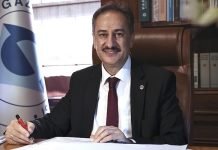The European Commission expressed concern on Wednesday about attempts to restrict press freedom in the Turkish Cypriot community, following disputed reports that Turkey had sought the extradition of veteran journalist Şener Levent, Turkish Minute reported.
Commission Executive Vice President for Cohesion Raffaele Fitto said the European Union “views with concern attempts to undermine freedom of expression and media pluralism in the Turkish Cypriot community.” He was responding to a parliamentary question by Cypriot MEP Costas Mavrides.
Media reports in July had claimed that Levent, a longtime critic of Turkey, had been ordered to appear before prosecutors in Ankara within 10 days or face extradition. That deadline has since passed, and no extradition request has been filed. The Turkish Cypriot “foreign ministry” denied the reports, calling them “disinformation,” according to the Turkish Cypriot news agency Tak.
Levent, who for years ran the Afrika newspaper in northern Cyprus, has faced repeated legal action over his work. The disputed extradition reports were linked to a cartoon published in Afrika in December 2017 that depicted a Greek statue urinating on Turkish President Recep Tayyip Erdoğan. A Turkish court later sentenced Levent in absentia to one year in prison for “insulting” Erdoğan, though a court in northern Cyprus acquitted him of related charges.
Cyprus has been divided since a Turkish military intervention in 1974 following a coup backed by Greece. The northern third of the island has since been administered by a Turkish Cypriot authority, which declared itself the “Turkish Republic of Northern Cyprus” in 1983 and is recognized only by Turkey. The European Union and the international community regard the Republic of Cyprus — an EU member state — as the island’s sole legitimate government.
Fitto said Turkey, as a candidate for EU membership and a member of the Council of Europe, is expected to respect its commitments on human rights. “The targeting of media and journalists runs counter to these commitments,” he said. “The EU has consistently underlined that Turkey urgently needs to reverse the negative trend of recent years and make tangible progress in upholding fundamental human rights.”
Last month Cypriot President Nikos Christodoulides wrote to EU leaders expressing “strong concern” over Levent’s case. He stressed that Turkish Cypriots, as citizens of the Republic of Cyprus and the EU, are entitled to full protection of their rights and urged Brussels to closely monitor the situation.















